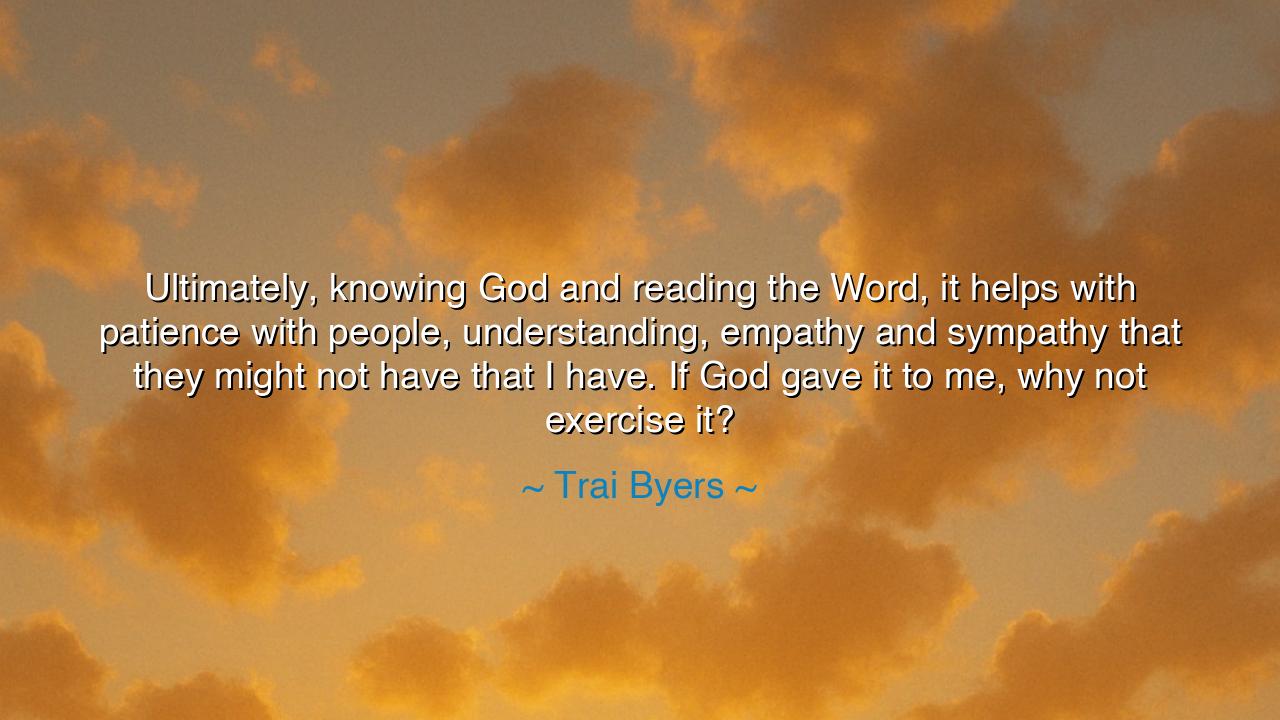
Ultimately, knowing God and reading the Word, it helps with
Ultimately, knowing God and reading the Word, it helps with patience with people, understanding, empathy and sympathy that they might not have that I have. If God gave it to me, why not exercise it?






Hear, O seekers of wisdom and bearers of faith, the words of Trai Byers, who declared: “Ultimately, knowing God and reading the Word, it helps with patience with people, understanding, empathy and sympathy that they might not have that I have. If God gave it to me, why not exercise it?” In this confession we hear the voice of one who has tasted of the divine fountain and found in it the strength to deal gently with others. For he teaches that the gifts given by God are not for hoarding, but for use; not for pride, but for service.
The meaning is thus: Byers testifies that knowing God and being nourished by the Word produces virtues that transform human relationships. From the Scriptures flow patience, understanding, empathy, and sympathy—qualities that may not dwell naturally in every heart. These are not born from human will alone but are graces bestowed from above. And if one has received such treasures, it is not fitting to bury them. Rather, as Byers says, they must be exercised, poured out into the world as light and balm for others.
The ancients knew this law of gift and responsibility. Consider the parable spoken by Christ Himself of the talents: the master entrusted his servants with wealth, and those who multiplied it were praised, while the one who buried it in fear was condemned. So too with the gifts of patience, empathy, and sympathy—if God has entrusted them to us, it is our duty to use them, to multiply them in service of others, lest we be like the servant who hid his gift in the ground.
History also bears witness in the life of St. Francis of Assisi, who, touched by the call of God, laid aside wealth and privilege to walk among the poor, the sick, and the broken. He had been given compassion beyond measure, and rather than keeping it as a personal treasure, he exercised it among those who lacked it most. In doing so, he turned his gift into a legacy, a living sermon that continues to inspire hearts across centuries. His life reflects Byers’ wisdom: what God gives is not for self-glory, but for the healing of the world.
At the heart of this reflection lies a sacred truth: that the virtues of patience and understanding are not merely for one’s own peace, but for the building of harmony among people. In a world filled with anger, division, and haste, those who have been given the strength to endure and to empathize bear a holy responsibility. For they become like oases in the desert, offering refreshment where others only find thirst. Byers’ words remind us that to withhold such gifts is to rob others of the grace they desperately need.
The lesson, then, is clear: exercise the virtues God has planted within you. If you are patient, show patience to the impatient. If you are understanding, extend understanding to those who cannot yet see. If you are compassionate, let your compassion heal wounds. Do not grow weary of giving, for in giving you fulfill the very purpose of the gift. The strength you offer may awaken in others the very qualities they lack, and thus the chain of grace spreads from heart to heart.
What, then, should you do? Begin each day by remembering the gifts you have been given—not in pride, but in gratitude. Ask how you may use them to lift another’s burden, to soften another’s anger, to comfort another’s pain. Do not wait for perfect opportunities; even in small acts—an encouraging word, a moment of patience, a gentle ear—you exercise the grace entrusted to you. In so doing, you honor not only others, but the Giver of the gift Himself.
Thus let Trai Byers’ words echo across generations: “If God gave it to me, why not exercise it?” For this is the creed of every faithful soul: to use what has been entrusted, to shine what has been lit, to pour forth what has been poured into us. And when you live by this truth, your life becomes not only your own, but a vessel of divine grace, carrying light into a world that groans in darkness.






AAdministratorAdministrator
Welcome, honored guests. Please leave a comment, we will respond soon